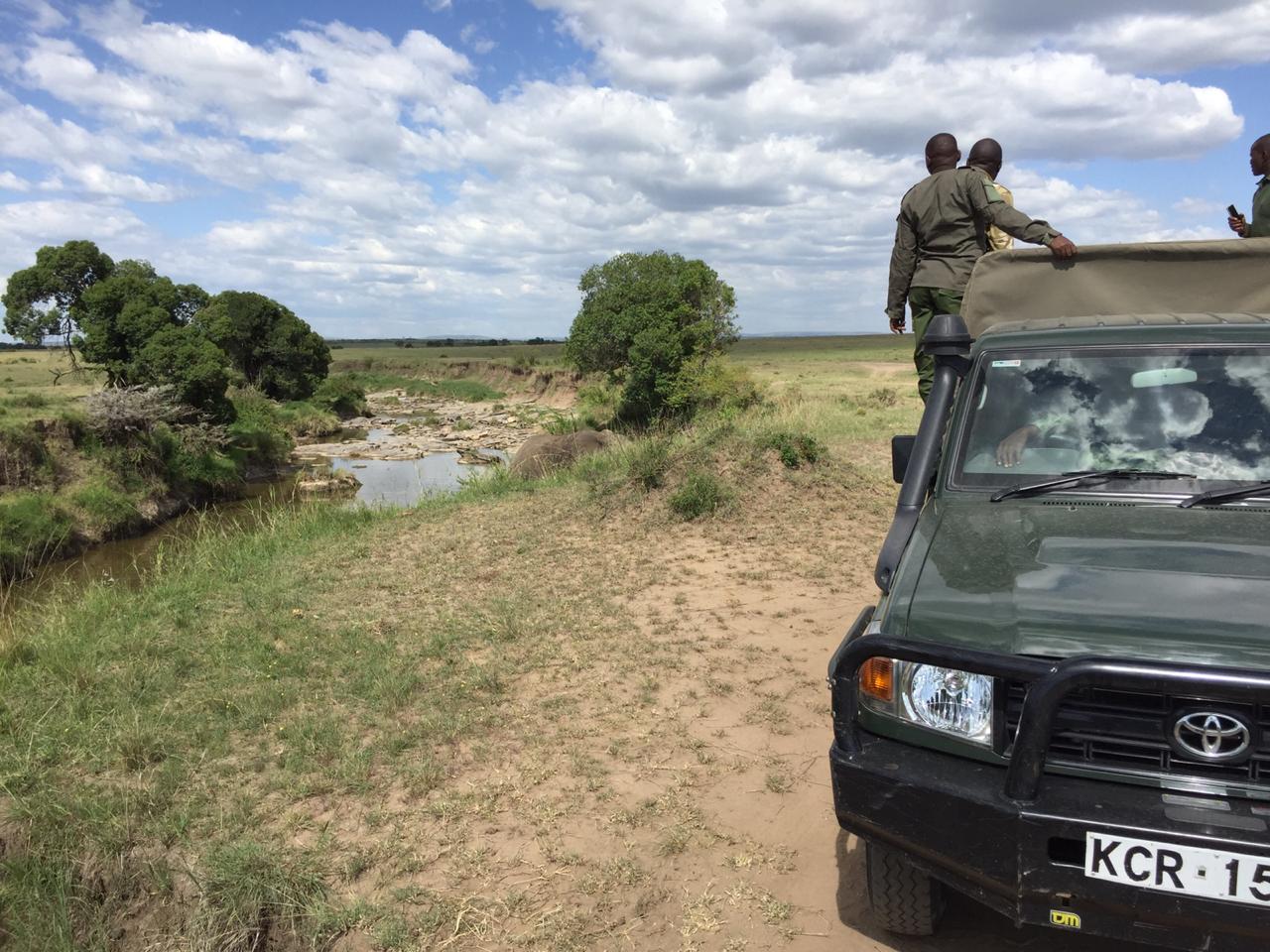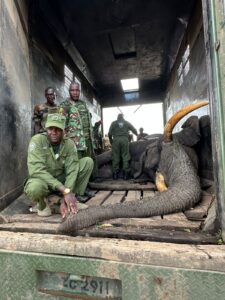
In January there wasn’t a lot of rain in the Mara which meant there were very little crops in the fields; however, in the Mau, there is higher rainfall which leads to two harvest seasons and to start 2019 the fields had ripe maize crops in them which meant MEP rangers were responding to increased human-elephant conflict. Out of the total 38 incidents of human-elephant conflict in the first quarter, 10 were in the Mau and Olpusimoru area, six of those occurring in January. As a result, the Sheldrick Wildlife Trust (SWT) Mau De-Snaring Unit rangers based out of the Emitik area moved to the Olpusimoru forest edge in January where the elephants were coming out at night to crop raid (pictured left).
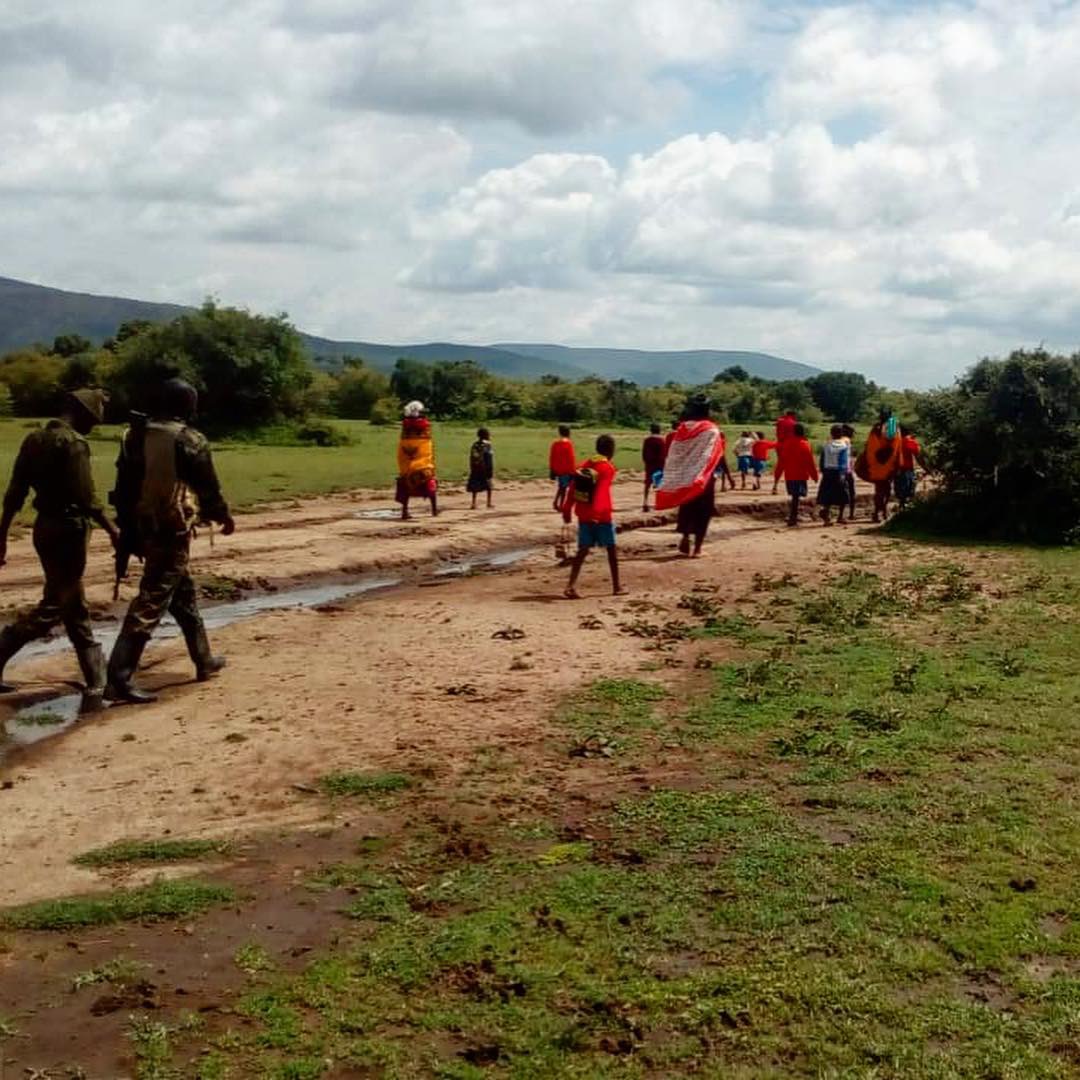 School children being escorted to school by MEP rangers in January in a high human-elephant conflict area.
School children being escorted to school by MEP rangers in January in a high human-elephant conflict area.
MEP rangers focused on the Lemek area in February where human-elephant conflict was high. The Enkutoto ranger team operating in Lemek responded to seven conflict incidents in February and continued to be busy into March. Most of the conflict incidents were mitigated using vehicles, bright lights and flashbangs and and for the first quarter of 2019 there were two elephant deaths as a result of human-elephant conflict.
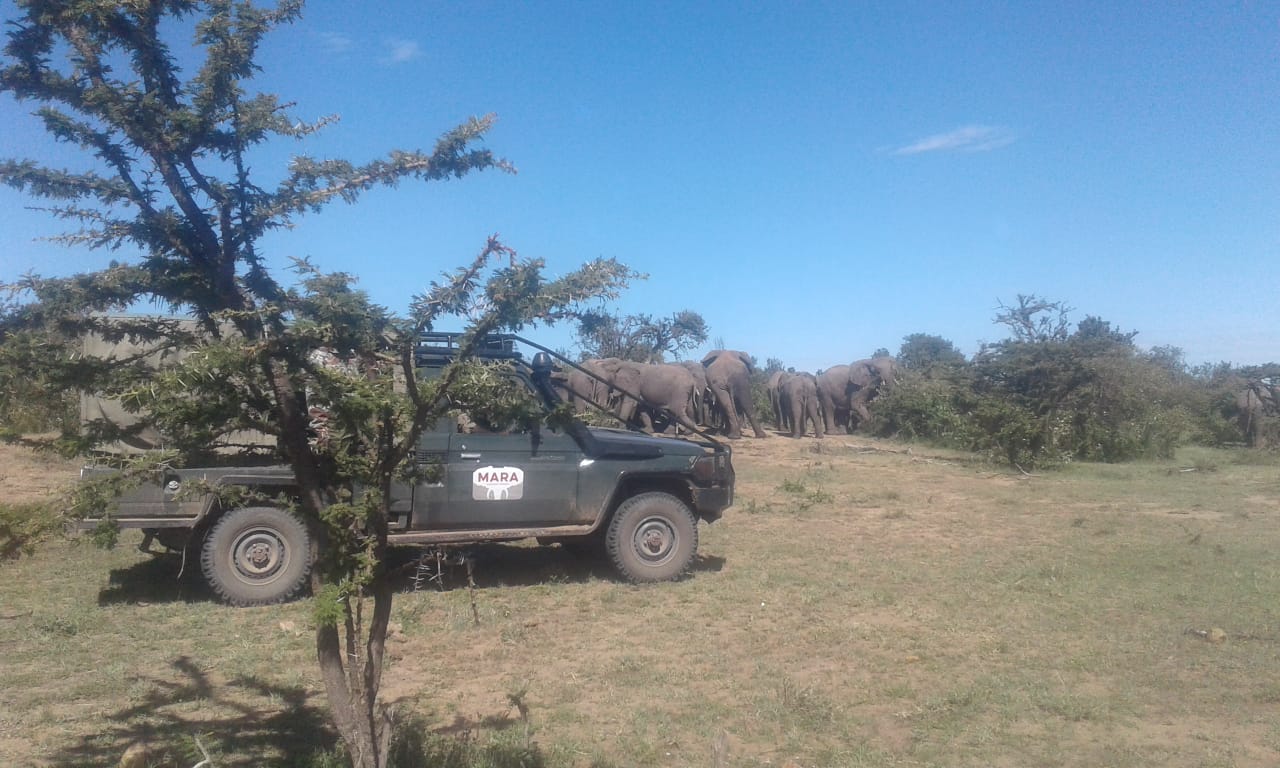
MEP rangers moving a herd of elephants in February out of community land.
 MEP rangers along with our government partners, Kenya Wildlife Service (KWS), started 2019 with two notable illegal firearms recoveries and one arrest. On January 19, 150 rounds of ammunition were recovered (pictured right) then the next day an AK47 and one suspect was arrested by the Tanzania National Parks Authority in the eastern extent of the ecosystem in the Loliondo area. The second firearm was recovered two days later by the Kenya Police based on MEP intelligence near Lolgorian in the western extent of the ecosystem, but, unfortunately, the two suspects escaped. In February, TANAPA also following MEP intelligence arrested one suspect with an illegal firearm which was suspected to be used to poach wildlife in the Serengeti. In the first quarter, six suspects were arrested, and 16 kg of ivory was confiscated along with hippo and warthog teeth. The largest bust took place in February, where three suspects were arrested by KWS near Nairobi in the Kitengela area with 12 kg of ivory. This operation was made possible through the intelligence MEP gathered.
MEP rangers along with our government partners, Kenya Wildlife Service (KWS), started 2019 with two notable illegal firearms recoveries and one arrest. On January 19, 150 rounds of ammunition were recovered (pictured right) then the next day an AK47 and one suspect was arrested by the Tanzania National Parks Authority in the eastern extent of the ecosystem in the Loliondo area. The second firearm was recovered two days later by the Kenya Police based on MEP intelligence near Lolgorian in the western extent of the ecosystem, but, unfortunately, the two suspects escaped. In February, TANAPA also following MEP intelligence arrested one suspect with an illegal firearm which was suspected to be used to poach wildlife in the Serengeti. In the first quarter, six suspects were arrested, and 16 kg of ivory was confiscated along with hippo and warthog teeth. The largest bust took place in February, where three suspects were arrested by KWS near Nairobi in the Kitengela area with 12 kg of ivory. This operation was made possible through the intelligence MEP gathered.
The SWT Mau De-Snaring Unit was extremely busy this quarter as they continued to remove snares used for bushmeat poaching in the Mau Forest and combatted the increase in drop spears targeting elephants that have been found and removed. They were also fighting eight forest fires that began on March 18 in the Mau Forest and after their incredible effort were all out by the end of the month.
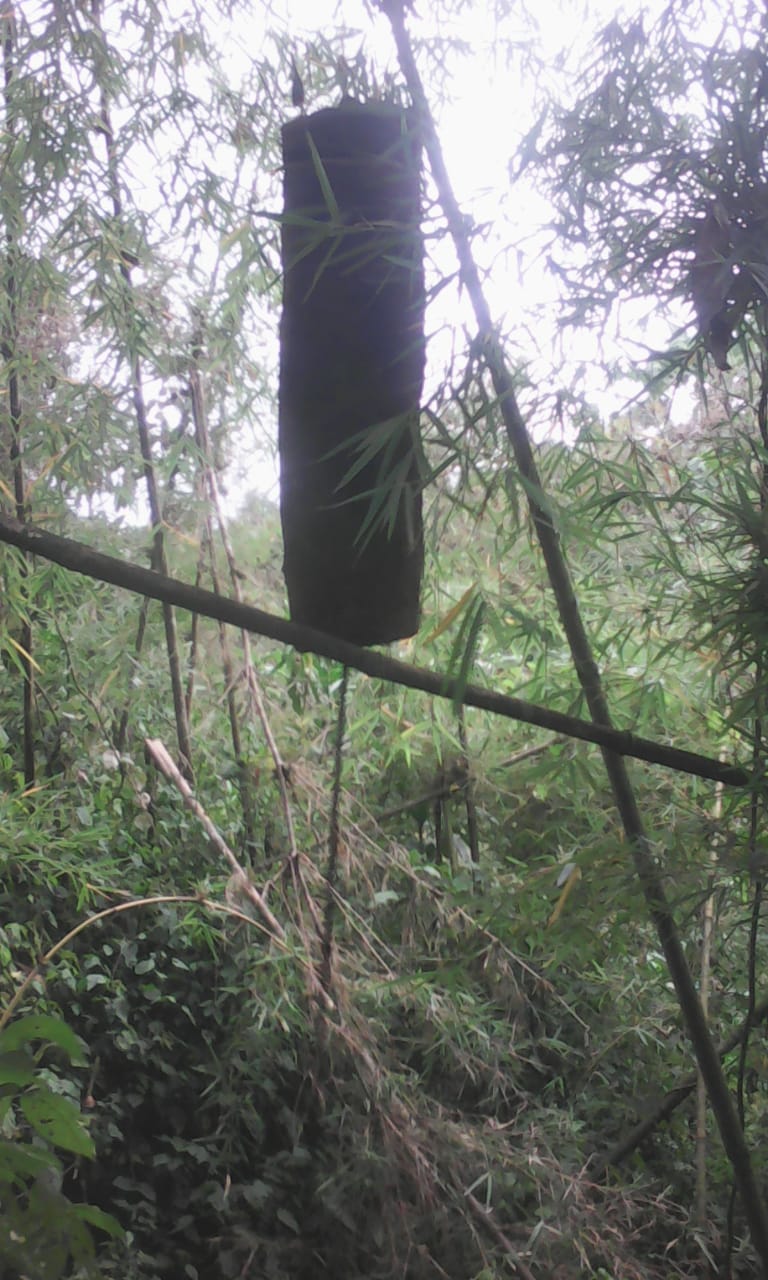
A drop spear in the Mau Forest confiscated in February.
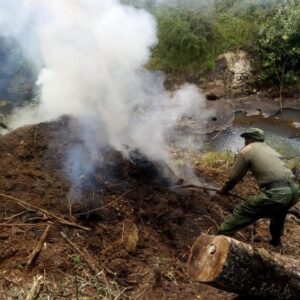
In total in the first quarter, MEP rangers removed 89 snares (55 in January by the SWT Mau De-Snaring Unit) and eight spears used for targeting elephants. MEP rangers also destroyed five kilns (pictured right), 20 sacks of charcoal and arrested seven suspects for illegal logging in the Mara.
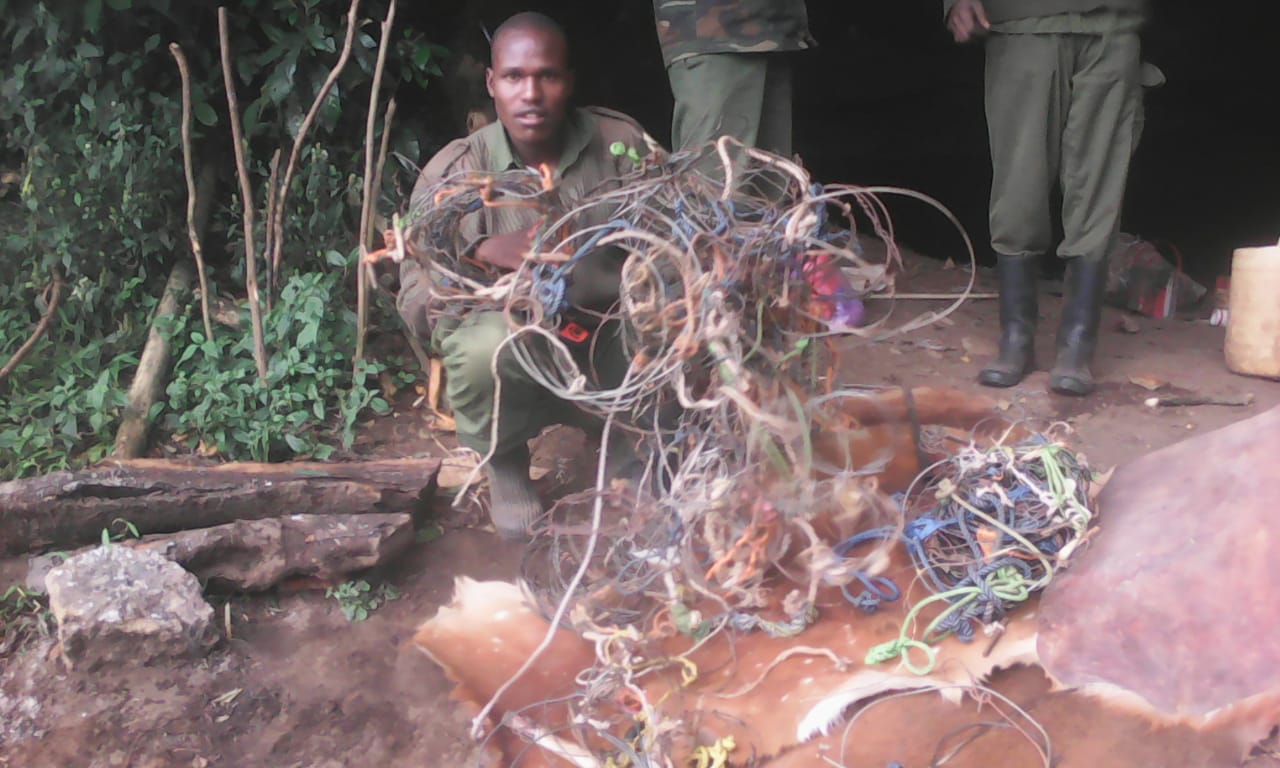
A ranger in the SWT Mau De-Snaring Unit showing the snares collected in the Mau Forest in January.
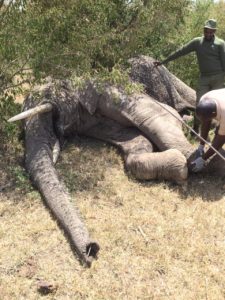
Finally, MEP rangers also provided ground support for KWS Vet Dr. Limo in four elephant treatments. There were two elephant treatments in February, one incident where MEP’s patrol team assisted KWS Vet Dr. Limo in the treatment of an elephant with a foot injury that was sustained after breaking through fences in the Endoinyio Erinka area (pictured left). We’re happy to report the treatment went well and the Pardamont Conservancy rangers continued to monitor this elephant after the treatment, and it was healing.
Continued ranger training is an essential focus of MEP fundraising in 2019. Key to the effectiveness, morale and retention of rangers is on-going training and development. MEP aims to provide ten days of training per annum per ranger at a total cost of $21,000 for MEP ranger training and development in 2019.
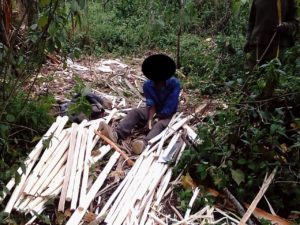 In 2018, MEP also increased our area of operation to include the Mau Forest and Loita Hills. These two areas are vastly under regulated and illegal logging, poaching and human-elephant conflict are all extremely high (pictured left: March arrest for illegal logging). The Sheldrick Wildlife Trust provided funding for the creation of the Mau Forest unit and MEP was able to expand into Loita by re-deploying rangers from the core rapid response units away from conflict hotspots during the low conflict seasons. In 2018, in the Mau and Loita area MEP made significant anti-poaching headway and increased security in these two areas. Additionally, the rapid response unit started working with a self-help forest patrol unit based in the Emitik area near Olengururone, which allowed them to have local help while operating in the forest. Their efforts need to continue to be supported in 2019. The existing operations cost $46,000 a month for MEP anti-poaching and rapid response units to continue to make an impact in the field. This includes support for salaries for rangers, rations, the cost of running vehicles and stipends for attached rangers from KWS. If you’re interested in supporting MEP rangers, please contact us today.
In 2018, MEP also increased our area of operation to include the Mau Forest and Loita Hills. These two areas are vastly under regulated and illegal logging, poaching and human-elephant conflict are all extremely high (pictured left: March arrest for illegal logging). The Sheldrick Wildlife Trust provided funding for the creation of the Mau Forest unit and MEP was able to expand into Loita by re-deploying rangers from the core rapid response units away from conflict hotspots during the low conflict seasons. In 2018, in the Mau and Loita area MEP made significant anti-poaching headway and increased security in these two areas. Additionally, the rapid response unit started working with a self-help forest patrol unit based in the Emitik area near Olengururone, which allowed them to have local help while operating in the forest. Their efforts need to continue to be supported in 2019. The existing operations cost $46,000 a month for MEP anti-poaching and rapid response units to continue to make an impact in the field. This includes support for salaries for rangers, rations, the cost of running vehicles and stipends for attached rangers from KWS. If you’re interested in supporting MEP rangers, please contact us today.
One of the main fundraising goals for 2019 is establishing a permanent ranger unit in the Loita Hills. This fits directly into the first quarter report because in February an elephant carcass was reported to MEP rangers and was around two months old with its tusks removed, cause of death: poaching. Currently, MEP has been able to expand into the Loita area by re-deploying rangers from the core rapid response units away from conflict hotspots during the low conflict seasons and this response has already made an impact. In October 2018 our intelligence unit arrived in Mosiro and discovered an active poaching ring operating in the area. An elephant carcass estimated to be a month old was found without tusks. Additionally, the animals were all very skittish and though they found elephant tracks, there was no evidence of elephants stopping to eat or drink, meaning they were aware they were under threat. MEP CEO Marc Goss and Senior Warden James Ekiru deployed the helicopter to help find a reported large elephant herd and investigate the Loita area by air. What they found was very discouraging; lots of illegal logging was taking place in the forest, the community farms were encroaching on the forested land and they even found an active poachers camp. A herd of over 100 elephants was observed living in this portion of the forest, all of which would be at a high risk of poaching or being harmed while coming in contact with humans. In response, MEP deployed its rapid response team into this northern section of the Loita Forest to monitor the elephants, shutdown illegal logging sites, root our any poachers, and help mitigate human-elephant conflict and better relations for the bordering community. As a result, in October, four suspects were arrested for illegal logging with 500 posts confiscated. Though the rapid response unit made significant headway, without a permanent team in the Loita Forest it is very difficult to effectively provide elephants protection and gather information on the ever-changing situation.
A permanent ranger presence is needed to really make an impact in this area. MEP needs support for two years to establish a permanent ranger unit for the Loita Hills at an operational cost of $52,000 a year plus a further $71,000 for ranger field equipment and a vehicle resulting in an overall cost over the two years of $174,500. Based on what we’ve just experienced with the establishment of a permanent Mau Forest unit, a two-year timeline is necessary to ensure that the proper training and equipment is established within the first six months of the team before an impact can really be made. This team would be established as soon as funding is secured and consist of seven rangers, a driver and two KWS rangers that are well-equipped and trained to start making an impact in this area.

Posts continue to be found and confiscated in both the Mau and Loita Forest areas of the Mara ecosystem. Seen here are 800 posts confiscated in March.
Finally, ranger retention and morale are of the upmost important to MEP. This is why in 2019 we introduced a program where each MEP ranger can have the school fees provided in full for up to two of their children and we’d love to find a patron for this initiative. This program costs $15,000 per year and MEP feels it’s vitally important to recognize the central part the rangers play in our conservation operations and the need to ensure funding for ranger welfare is essential to recognize their dedicated efforts. If you’re interested in supporting MEP’s rangers, please email us today.
“On behalf of MEP rangers, we are really grateful for the children school fees program. The program has benefited all of MEP ranger’s children in different levels in schools. This has eased our role as parents because our children are getting quality education through this program. All rangers are really happy, and all say thank you since the start of the program. I want also to say thank you to our CEO, Marc Goss and MEP Board of Trustees for coming up with this program.” MEP Assistant Warden Jackson Maitai
